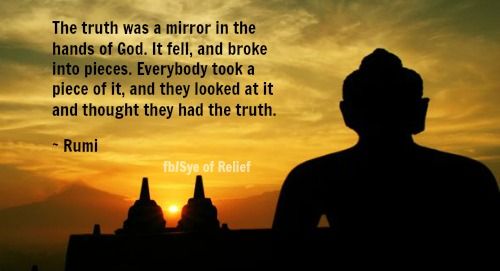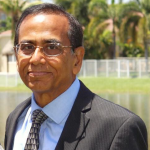
 What is “self-evident”? Is it evidence looking at itself in the mirror? Men are certainly not born equal in this world. Whether they are born in America or Somalia, their skin color, race and religion, to rich or poor parents makes all the difference to their position in society and their journey in life.
What is “self-evident”? Is it evidence looking at itself in the mirror? Men are certainly not born equal in this world. Whether they are born in America or Somalia, their skin color, race and religion, to rich or poor parents makes all the difference to their position in society and their journey in life.
By Nazarul Islam
I begin this piece, without prejudice. I have no malice against any faith, practiced by people around the world. And …I share my greatest respects for religious leaders and scholars, who share their respective faith, according to their beliefs.
In a recent conversation between Pope Francis and Iran’s Grand Ayatollah Sistani, the Vatican Pope had remarked: “Perhaps all of us are either brothers by religion, or are created equal,” Christianity’s modern day leader, Pope Francis had travelled all the way, down to one of the most revered Muslim shrines of Hazrat Ali (AS), located at Najaf in Iraq.
Without prejudice, this profound observation has encapsulated the essential dichotomy between a religious belief, as opposed to the secular view of Man and Creation.
Therefore, little reason exists to disagree that out of the three accepted theories, ‘religion’ and ‘equality’ are man-made abstractions or social categories of perception while the third, we know as ‘creation’ is an objective reality.
What Ali al-Sistani had meant that day could be summarized briefly: that, in a given society, we can either have a ‘brotherhood’ of believers, with an innate but benign hierarchy that creates a bond of belonging with empathy and warmth, or we can have a relationship of ‘equality’ between unrelated strangers, as a notional status but enforced legally through the power of the State.
In the religious cosmos, the State doesn’t precede over the others, in the sets of beliefs we have created. First and foremost is the concept of the Omnipotent Bhagavan, God or Allah. It’s His commandment that we need to follow. And in this context, the State is required to align itself to the laws of ‘faith’ or ‘morals’.
In a secular world, however, man’s position is defined not in relation to God but to other men. Everyone is equal in facing a hostile universe that is neither orderly nor predictable, but they have to unite in purpose and effort to strive for the common good. This secular State need not be irreligious, as faith is pushed into private life, but it has to imagine morals without religion and a saint in the absence of God.
Philosophers of Existentialism, such as Albert Camus, or Nietzsche have examined this human contingency. The men of robes, conferring in Najaf also seem to be confronted with similar questions.
When Thomas Jefferson wrote the now-famous dictum that “We hold these truths to be self-evident: that all men are created equal” as a foundational idea in the Declaration of Independence in July 1776, was he playing tricks with ‘evidence’?
What is “self-evident”? Is it evidence looking at itself in the mirror? Men are certainly not born equal in this world. Whether they are born in America or Somalia, their skin color, race and religion, to rich or poor parents makes all the difference to their position in society and their journey in life.
It is, of course, a noble ideal and an empowering one that has incited men to revolutions. But is it true as a belief? Perhaps it’s as true as religious beliefs, for instance the ‘Immaculate Conception,’ are.
More importantly, in the creation of the United States, Thomas Jefferson was breaking 1,700 years of Christian tradition that emphasized a ‘brotherhood of believers’ and asserting a fictional ‘equality’ of strangers, of atomized individuals that were to become the centerpiece of Liberalism, Democracy and Secularism.
Did he mean ‘Equality’ as a verb, a state of occurrence in society, or did he see it as a promise to be fulfilled by the State?
‘Brotherhood’ in both the Semitic religions has had a long history, but it was conceived more as a protection against the ‘Other’. For instance, the legendary armed religious order, the Knights Templar, born after the First Crusade in the early 12th century, was created as an army of Roman Catholics to protect pilgrims marching to Jerusalem against murderous attacks by Muslim militias.
British historian Dan Jones explains in his book The Templars how they went from protecting pilgrims during the Crusades to controlling a vast financial empire, how their belief in religious martyrdom is shared by groups like ISIS, and why the Templars’ crusading spirit and anti-Muslim rhetoric is attracting a new generation of white supremacists and neo-Nazis.
And more recently, we saw how the Christian church groups in America heavily funded and rallied in support of former President Donald Trump, an unabashed supporter of white supremacists.
In Islamic countries, ‘brotherhood’ is mainly associated with the ‘Muslim Brotherhood’, an insurrectionary organization founded by Hassan al-Banna in Egypt in 1928, a party that came to power for a year from June 2012 under the leadership of Mohamed Morsi, following the January 2011 Arab Spring.
What was once conceived as a liberating force to fight against the monarchs and dictators in the Islamic world is now labelled a terrorist organization. Further, the monarchs and dictators have become ever more powerful to sustain themselves in power by creating organizations such as the ‘Islamic State’ that is savagely violent and nihilistic, without any liberating or positive ideology of hope – All in the name of religion.
In Hinduism, where people are essentially seen as ‘Homo Hierarchicus,’ a religion that sanctioned a stratified society of unequal people, the notion that “all men are created equal” is perhaps non-existent. The notion of ‘brotherhood’, too, is difficult to imagine because Hinduism is not a monotheistic religion but an amorphous theology of multiple Gods and Goddesses, with each caste appropriating its own God.
And in the absence of a monotheistic God, the brotherhood of believers gets dispersed into caste-wise aggregation. So, we have a religion with neither equality nor brotherhood.
Nevertheless, the effort to create a ‘brotherhood of Hindus’ began with the RSS in 1925 when they took up the task of protecting and promoting their interests through militant nationalism, not against British rule but against rising Muslim mobilization. It is now the world’s largest voluntary organization. How far has it succeeded in creating a ‘brotherhood of Hindus’ is open to question, particularly in view of allegations of upper-caste bias in its leadership.
However, this ‘brotherhood’ was not much of a force, either political or religious, till its ‘kar sevaks’, led by L K Advani’s ‘Rath Yatra’ destroyed the Babri Masjid in December 1992. Only when it turned malevolent and violent, the ‘brotherhood’ of religion became a weapon for capturing State power.
Can there be a ‘brotherhood of men’ without religion? And can it be a force for peace and good?
Wonder what the Ayatollah and the Pope have to say on that…
____________________
About the Author
 The Bengal-born writer Nazarul Islam is a senior educationist based in USA. He writes for Sindh Courier and the newspapers of Bangladesh, India and America. He is author of a recently published book ‘Chasing Hope’ – a compilation of his 119 articles.
The Bengal-born writer Nazarul Islam is a senior educationist based in USA. He writes for Sindh Courier and the newspapers of Bangladesh, India and America. He is author of a recently published book ‘Chasing Hope’ – a compilation of his 119 articles.